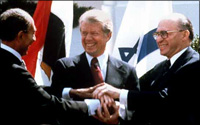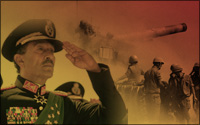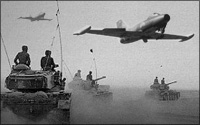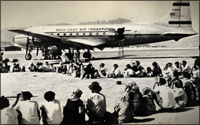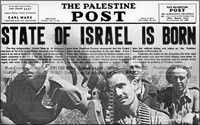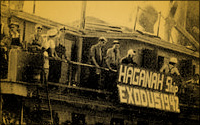 The end of the war in the European theater in May 1945 allowed the world for the first time to see what had happened to the Jewish community. And it created not only a terrible, overwhelming feeling of revulsion and horror, but an even more deep-seated feeling of temporary guilt – at least temporary guilt.
The end of the war in the European theater in May 1945 allowed the world for the first time to see what had happened to the Jewish community. And it created not only a terrible, overwhelming feeling of revulsion and horror, but an even more deep-seated feeling of temporary guilt – at least temporary guilt.
Consequently, the Jewish people — for about three to four years — enjoyed the sympathy and political approval of a majority of the Western world. In time this state of approval would change. However, the world felt that the commission of such a heinous crime by a civilized society in the heart of Europe in the 20th century was a blot on the honor of all civilized countries and peoples. And it engendered a pro-Jewish reaction.
Battling the British
If one looks at the big picture of Jewish history one has to stand back in awe. So many unlikely events have happened that one has to stand back and wonder. The history of post-Holocaust Jewry is no different. At this time a series of very unlikely, unpredictable and absolutely strange events conspired to bring about the State of Israel. Even without approaching it from any political or Zionist point of view, the objective observer has to concur that it was these unpredictable events that made a difference.
In the summer of 1945, after the war, Great Britain voted for Prime Minister. Winston Churchill had saved England. Everyone knew it and acknowledged it. It is no exaggeration to say that he saved the Western world. Who was deserving of electoral victory after the war more than Winston Churchill?
Yet, the British rewarded his efforts by voting him out of office! In fact, it took place during the Potsdam peace conference. In the middle of this major and historical international peace conference Churchill had to step down and allow his replacement, Clement Atlee, to represent England. It is unimaginable. But it happened.
If Churchill and the Conservative Party would have remained in power the chances for a state of Israel emerging would have been greatly reduced, if not altogether impossible. The reason is reverse psychology. Churchill’s opponent, Atlee and his Labor Party, pushed an anti-Jewish agenda. If they had not pushed the anti-Jewish line – allowing some sort of Jewish immigration to Palestine and mollifying the Jews even minimally – they would have averted the enmity that led to the creation of the state.
Clement Atlee became prime minister and appointed Earnest Bevin as his foreign secretary. He was a rough and tough labor union organizer, a devoted socialist – and he did not like Jews. Bevin announced at the beginning of his tenure, “I will not allow the Jews to push to the head of the queue.” In other words, Jews are too pushy. England has other problems.
His reference was to the request that 100,000 Jews – of the 250,000 left in Europe — be allowed to go to Palestine. The request was not to have a Jewish state. If England would have agreed to even a portion of that number – perhaps even as low as 35,000 – it might have quelled Jewish advocacy. Bevin, however, said not one.
The reaction of the Jews, especially in Palestine, was that the only alternative was to fight the British. Consequently, they organized an illegal underground throughout Europe, infiltrated all of the camps and conscripted Jewish refugees to march hundreds of miles to embarkation points for travel to Palestine. People were loaded on the ships and the process of illegal immigration began.
At first it was successful. England was not prepared to counteract it. Palestine had a long coastline and in the dead of night it was possible to unload a few hundred people and be gone by dawn. The immigrants were absorbed into the kibbutzim and Jewish enclaves. The Jews forged documents and identification papers. It amounted to a fairly sizable illegal immigration.
When the Arabs realized it they complained bitterly. The British navy was called in and instituted a blockade of the eastern Mediterranean. It was very effective. It intercepted the ships and deposited the would-be illegal immigrants at a very large detention camp on the island of Cyprus. This camp was similar to the DP camps, which were similar to the concentration camps.
When the world found out about it, sympathy for the Jewish plight ballooned. At the same time outrage at British callousness skyrocketed. They had, in effect, taken ragged survivors of unspeakable horrors from one unacceptable camp to another.
The more intransigent the British became the more it was returned with violence by a number of different Jewish military organizations. As British casualties mounted it also had an effect on public opinion in Britain. Earnest Bevin responded by trying to force the Jews to their knees.
The most famous incident during this period involved the immigrant ship Exodus, which carried on it almost 2,000 Jewish refugees. The British intercepted it and brought it all the way back to Germany, not Cyprus, and dragged them screaming off the ship. The pictures of that caused a public relations disaster for the British.
Partition Plan
As the violence increased, public pressure mounted in England to get out of Palestine. The British saw that they had lost world approval. It was a no-win situation for them.
Therefore, Bevin made a dramatic gesture. He declared that England was going to leave on May 15, 1948. Let the United Nations figure out how to deal with all the problems there. England was going to wash its hands of the whole ordeal.
The United Nations responded to England’s declaration that it would withdraw from Palestine by creating a committee to study the problem. After a few months it came up with a dramatic idea: a Partition Plan. They would partition Palestine into three sections: an Arab state, a Jewish state and an international section.
The Jewish state was to be comprised of a large chunk of the Negev (the south), the coastal strip from Tel Aviv to Haifa and a portion of the Galilee. All told it represented a very small piece of Palestine, and was not even contiguous; the pieces were not connected to each other. Militarily it was indefensible, and economically it was not viable. The Arabs were to get the rest of Palestine and Jerusalem was to be an international city.
The reaction of the Jews and Arabs to the Partition Plan established a pattern that would repeat itself again and again. The Jews thought it was terrible for them – but they would accept it. The Arabs rejected it outright. In the entire history of the Arab-Israeli struggle the Arabs have always been one step in the past. In 1973 they wanted the 1967 borders. In 1967 they wanted the 1956 borders. In 1956 they wanted the 1948 borders. In 1948 they wanted the Partition borders. When they were offered the Partition borders they did not want anything. If at any point they would have agreed to the borders as proposed at that time, history would have been different. But they have never said yes.
Enter Eddie Jacobson
To pass the Partition Plan a two-thirds vote of the General Assembly of the United Nations was needed.
The United States favored the plan, however Arabists in the State Department exerted a great deal of pressure, even circumventing the President of the United States, Harry Truman. The US delegate to the United Nations was a former senator, Warren Austin. He proposed a trusteeship, which was really just another Mandate. At this point, the proposal to create the State of Israel was all but dead.
Enter one of the strangest twists of fate in history.
President Truman had been an artillery captain in the First World War. One of the members of his battalion was a Jewish man by the name of Eddie Jacobson. After the war, they went into an unlikely partnership running a haberdashery store in Kansas City, Missouri. The store was a failure. However, they had developed a loyalty to and an affinity for each other.
Truman went on to a career in politics, eventually becoming a senator and from there to the vice presidency of the United States. When Franklin Roosevelt died he became the president. It is as unlikely a rise to prominence as there is.
Chaim Weizmann, who by now was old, tired and half-blind, traveled from London by ship to New York to try to see Truman and get him to support the Partition Plan. Truman refused to see him.
Then a call went to Eddie Jacobson. Truman was, of course, happy to see his old war buddy, former business partner and friend he still had fond feelings toward. The meeting was recorded both in Truman’s memoirs and Jacobson’s recounting: “Harry, Mr. President, you have to do me one favor,” Jacobson said. “You have to see Chaim Weizmann. He came halfway across the world to see you. Just give him a few minutes of your time.”
Jacobson writes that Truman was livid at the suggestion – and expressed so in colorful Missouri terms. He said it was unfair of Jacobson to ask him, etc. But in the end he saw Weizmann.
Chaim Weizmann was a great diplomat with the ability to impress people. He said to the president, “The opportunity of the ages has been invested in your hands. If you will stay strong now you will go down for all eternity.”
Truman was impressed with his words, called up Warren Austin at the UN and told him the American policy regarding Palestine had just changed. In fact, Austin was in the middle of a speech when Truman called, telling the assembled how the United States was withdrawing its support of the Partition Plan. He stopped, heard Truman and returned to the Assembly to say that the President of the United States had just instructed him that the United States fully supports the Partition Plan as adopted by the United Nations and will work to see it implemented….
The Final Tally
The news had a domino effect. It is really too remarkable and too long a story to detail how the 33 votes that were necessary to get it passed were obtained. For instance, one delegate from a certain country voted yes when his country told him to vote no. Perhaps the most unlikely event was that Russia and the United States were on the same side of the issue!
The Partition Plan was adopted on November 29, 1947. For Jews there was a tremendous outpouring of emotion as the finally tally was broadcast live. It was the first time that the world said there was going to be a Jewish state.
The day after the plan passed the Arabs attacked. People do not realize that the war did not begin in May 1948. Most of the War of Independence was fought before the declaration of the state. This unofficial war was fought with England still in the country, and clandestinely supporting the Arabs.
The Israeli air force at the beginning of the war consisted of a Piper Cub. The pilot leaned over and threw a hand grenade out the window. Israel possessed only a few tanks, and many were stolen from the British. Yet, they fought bravely.
A great deal of the world secretly rooted for the Jews. The guilt and horror of the Holocaust gave the Jews the sympathy of the world, if not its aid, allowing them to do what they could with their own resources to eventually be victorious.

